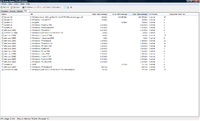Task manager

Process Hacker is a free and open-source task manager for Windows. It has some features which some competitors do not; for example, it can change a process's I/O priority.
A task manager is a system monitor program used to provide information about the processes and programs running on a computer, as well as the general status of the computer. Some implementations can also be used to terminate processes and programs, as well as change the processes priority. In some environments, users can access a task manager by pressing the buttons Control-Alt-Delete.
Task managers can display currently running services (processes) as well as those that were stopped. They can display information about the services (such as Process ID and group) if known.
Common task managers
- Windows Task Manager on Microsoft Windows
- Activity Monitor on Mac OS X (known as Process Viewer prior to Mac OS X v10.3)
- Conky on Linux, FreeBSD and OpenBSD; similar to GKrellM
- Force Quit on newer versions of MacOS
- GKrellM on BSD, Linux, Solaris and Mac OS X, and Windows; actually a system monitor (cannot kill processes, etc.)
- Gnome System Monitor on Linux systems with Gnome desktop[1]
- htop, available for Linux systems
- KDE System Guard and KTop on KDE 3
- LxTask, the task manager of LXDE; also used by Puppy Linux
- nmon, short for Nigel's Monitor and there are ports to many CPU and O/S architectures
- nmon Analyser, an agnostic analyser for data created by nmon
- Process Hacker is a free, powerful, multi-purpose tool that helps you monitor system resources, debug software and detect malware[2]
- ps (Unix)
- qps, task manager for Linux systems with Qt graphical interface and a similar htop aesthetic
- Remote Task Monitor, for Linux, Windows CE devices
- tasklist, for use in the Windows Command Prompt
- top (software) utility present in most Unix-like systems and the archetype after which others are modeled
References
- Savill, John (2008). The Complete Guide to Windows Server 2008. Pearson Education. ISBN 0-13-279758-5.
This article is issued from
Wikipedia.
The text is licensed under Creative Commons - Attribution - Sharealike.
Additional terms may apply for the media files.